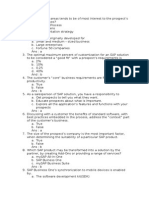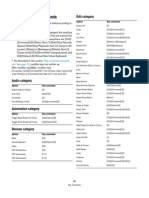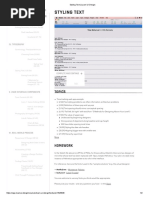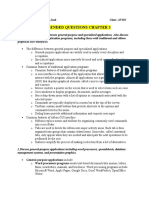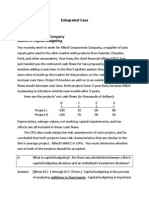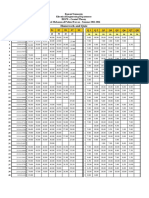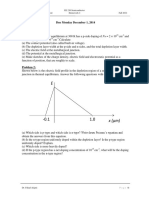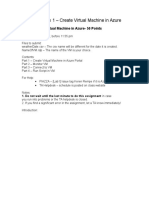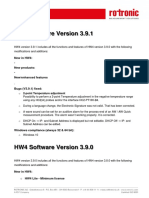Midterm Exam Key
Midterm Exam Key
Uploaded by
Saied Aly SalamahCopyright:
Available Formats
Midterm Exam Key
Midterm Exam Key
Uploaded by
Saied Aly SalamahOriginal Description:
Copyright
Available Formats
Share this document
Did you find this document useful?
Is this content inappropriate?
Copyright:
Available Formats
Midterm Exam Key
Midterm Exam Key
Uploaded by
Saied Aly SalamahCopyright:
Available Formats
CSE2421 MIDTERM Spring 2013
NAME __________________________________________
SCORE __________________/ 100
FYI: There are no compiler errors in the code presented on this exam. If you think there is, please bring it to
my attention.
NOTE: If there is not an answer in the blank provided, the answer is wrong.
Warning: This test is for your eyes only. The information on this exam is NOT to be shared in any way. This
exam is 100% your own work. If I see you trying to page through your exam to compare questions with your
neighbor, I will move you. If I see you looking at your neighbors paper, I will move you. If I suspect that you
are talking with your neighbor, I will move you. The time and attention this takes away from you taking
your exam is not available for makeup; that is, you get no extra time for not paying strict attention to your
own paper.
YOU MUST TURN IN EVERY PAGE OF THIS EXAM including the ref card page
Scratch area:
Spring 2013 Midterm#1 1|Page
TRUE/FALSE put a T or F in each blank (10 pts; 1 pt each)
________ main is a valid variable name. (T)
_______ Makefiles contain UNIX commands and will run them in a specified sequence. (T)
_______ continue, break and goto work in basically the same way and can be used interchangeably. (F)
________ The gdb command invokes a debugger environment. (T)
________ A typedef and a #define can be used interchangeably. (F)
________ Every C program will contain at least one preprocessor directive. (F)
________ reeves@osu is a valid variable name. (F)
________ C does not support objects (per a typical object-oriented programming definition). (T)
________ A switch statement can be used to switch on string values. (F)
________ A pointer is not a basic type in C, but instead, is called a derived type. (T)
MULTIPLE CHOICE (12 questions; 2 points each). Put your answer in the blank provided.
________ The correct order of compilation of a C program is
i) Compile source code to object code A. i ii iii iv
ii) Link object code and libraries B. i iv ii iii
iii) Create binary or executable file C. iv ii i iii
iv) Process Preprocessor directives D. iv i ii iii
E.
________ What will be output if you will compile and execute the following c code?
#include <stdio.h>
#define x 5+2 A. 343
void main() { B. 27
int i; C. 133
i=x*x*x; D. None of the above
printf("%d",i); }
________ What will be output if you will compile and execute the following c code?
#include <stdio.h> A. 0 1 2
void main() { B. 0 1 2 3
int i=0; C. 1 2 3
for(;i<=2;) D. Infinite loop
printf(" %d",++i); }
Spring 2013 Midterm#1 2|Page
________ What will be output if you compile and execute the following c code?
#include<stdio.h>
int main() {
A. 10
int i=10;
B. 20
int *ptr=&i;
C. The address of i
*ptr=(int *)20;
D. None of the above
printf("%d",i);
return 0; }
________ What is meaning of following declaration? int(*ptr[5])();
A. ptr is pointer to function
B. ptr is array of pointer to function
C. ptr is pointer to such function which return type is array
D. ptr is pointer to array of function
________ What will be output of following c code?
#include<stdio.h>
void main() {
struct field {
int a; A. A
char b; B. 5
} bit; C. 45
struct field bit1 = {5,'A'}; D. None of the above
char *p=&bit1;
*p=45;
printf("\n%d",bit1.a); }
________ What will be output if you will compile and execute the following c code?
#include<stdio.h>
void main() {
A. 1
int i=0;
B. 3
if(i==0)
C. 5
{
D. equal
i=((5,(i=3)),i=1);
printf("%d",i);
}
else
printf("equal"); }
________ ptr->next is the same as
A. ptr.next B. *ptr.next C. (*ptr).next D. none of the above
Spring 2013 Midterm#1 3|Page
_______ Determines when the variable is created and destroyed and how long it will retain its value.
A. linkage B. scope C. storage class D. none of the above
_______ Which one is not a valid scope type for the C programming language we are using?
A. file B. block C. prototype D. external
_________ On combining the following statements, you will get
char*p;
p=malloc(100);
A. char *p= malloc(100) B. p= (char*)malloc(100) C. All of the above D. None of the above
_________ Why can typecasting be dangerous?
A. Some conversions are not defined, such as char to int.
B. You might permanently change the value of the variable.
C. You might temporarily lose part of the data - such as truncating a float when typecasting to an int.
D. There are no dangers.
SHORT ANSWER (8 questions; 24 pts - 2,4,2,2,4,4,2,4). Put your answer in the blank provided.
sizeof(x) returns a value of: ___________ (2)
What will be output if you compile and execute the following c code?
#include<stdio.h>
int main(){
int a=5,b=10;
a=a+b-(b=a);
printf("\na= %d b= %d",a,b);
return 0; }
a = _________ b = _________ ANS a=10 and b=5
What is the value of the file pointer when there is an error opening the file? ______________________ (NULL)
Given:
int arr[3][4]
int * ptr = &arr
What value is added to ptr to reach the array location arr[1][2]? __________________ 6
[0][0], [0][1], [0][2], [0][3], [1][0], [1][1], [1][2]
arr +1 +2 +3 +4 +5 +6
Spring 2013 Midterm#1 4|Page
Determine the output of the following c code:
#include<stdio.h>
int main(){
int a=10; Designate output here: //Visibility within main block.
{ 30 15
a+=5; // not really a space //Accessing outer local variable a.
int a=20; // just there to help read it //Visibility within inner block.
a+=10; //Accessing inner local variable a.
printf(%d,a); //Accessing inner local variable a.
}
printf(%d,a); //Accessing outer local variable a.
return 0;
}
Determine the output of following c code which is stored in the file arg.c and the following command is given:
% arg c question bank
Designate output here:
#include<stdio.h> arg
int main(int argc, char *argv[]) { c
int i; question
for(i=0; i<argc; i++) bank
printf("\n%s",argv[i]);
return 0; }
Determine the output of the following c code:
#include <stdio.h>
void main() {
char *pwest = "west",*pnorth = "north", *peast="east", *psouth = "south";
enum location { east=1, west=2, south=3, north=4};
enum location direction;
direction = east;
if( direction == east )
printf("Cannot go %s\n", peast); } // Output: __________________________________
Cannot go east
In the following program how would you print 50 using p?
#include<stdio.h>
int main(){
int a[]={10, 20, 30, 40, 50};
char *p;
p= (char*) a;
} // _________________________________________________________
printf("\n%d",*((int*)p+4)); also printf(%d\n, *(p + sizeof(int)*4));
Spring 2013 Midterm#1 5|Page
CODE EVALUATION#1 (10 pts). Put your answers in the blanks provided.
Succinctly comment the 4 lines as designated and determine the output.
int * function(); // _________________________________________________________
int main() {
auto int *x;
int *(*ptr)(); // _________________________________________________________
ptr=&function; // _________________________________________________________
x=(*ptr)(); // _________________________________________________________
printf("%d",*x); } // Output is: _________ 10
int * function() {
static int a=10;
return &a; }
// function prototype/declaration
// declare ptr to be a function pointer (no params and return int to a pointer)
// assign the address/location of the function
// call the function
Spring 2013 Midterm#1 6|Page
CODE EVALUATION #2 (16 pts; 2 pts per blank) FILL IN THE BLANKS
A string (example "I am writing an email") is entered through the keyboard. Write a program in C to get the words
output in reverse order in a column as output. The example output, for the given example input, is:
email
an
writing
am
I
Assume that the user entered string will fit into the array size given in the program str[200]
#include <stdio.h>
void main()
{
char str[200]; *ptr!=0 also // declare identifier and initialize where appropriate
char *ptr = str, *temp; *ptr!=\0
int i=0, j; also
*ptr!=NULL
scanf("%[^\n]", str); (warning) // read user string/input; reads all characters until enter key
while (*ptr) also str[i] // loops until the nul character is found in the string array
{
i++; ptr = ptr + 1 // the identifier i is the number of characters in the string
ptr++; also
} ptr=&str[i] // ptr now pointing to the end of the string
for (j=0; j<=i; j++) also
{ ptr=str+i
if(*ptr==' ') // comparing to a blank
{
temp=ptr;
ptr--;
temp++;
while ((*temp!=' ') && (*temp!='\0') )
{
printf("%c",*temp); // printing a character
temp++;
}
printf("\n"); // end of outputting a word so go to a new line
}
else // not at the end of a word
{
ptr--;
}
}
while(*ptr != ' ') // printing last output word (which is first input word)
{
printf("%c",*ptr);
ptr++;
}
}
Spring 2013 Midterm#1 7|Page
CODE EVALUATION #3 (16 pts; 2 pts per blank) FILL IN THE BLANKS
The goal of this code is to reverse the order of a linked list by literally adjusting the links such that the beginning of
the list becomes the end of the list; and the end of the list becomes the beginning of the list.
#include <stdio.h>
typedef struct Node { // designate the look of a node structure
char data;
struct Node* next;
} Node;
void print_list(Node* root) // output the char data from each node
{
while (root) // traverse the linked list, printing each piece of data along the way
{
printf("%c ", root->data);
root = root->next;
}
printf("\n");
}
Node* reverse(Node* root) // puts null at the start of the list and root at the end
{ // and moves the links to reverse the list
Node* new_root = 0; // now the end is the start of the list; and the start, the end
while (root) // loop until end of list
{
Node* next = root->next;
root->next = new_root;
new_root = root;
root = next;
}
return new_root;
}
int main()
{
Node d = { 'd', 0 }; // initialize 4 nodes of the linked list
Node c = { 'c', &d };
Node b = { 'b', &c };
Node a = { 'a', &b };
Node* root = &a; // the variable root points to Node a
print_list(root); // prints a b c d
root = reverse(root);
print_list(root); // prints d c b a
root = reverse(root);
print_list(root); // prints a b c d
return 0;
}
Spring 2013 Midterm#1 8|Page
You might also like
- SAP Business One Sales Executive Exam Part 1Document2 pagesSAP Business One Sales Executive Exam Part 1Jinesh100% (1)
- ELEG270 Lecture 13 SE Online-1Document28 pagesELEG270 Lecture 13 SE Online-1Saied Aly SalamahNo ratings yet
- HW 1 PDFDocument4 pagesHW 1 PDFSaied Aly SalamahNo ratings yet
- Cubase 5 Keyboard Shortcuts & Macros (Charts + How-To) PDFDocument7 pagesCubase 5 Keyboard Shortcuts & Macros (Charts + How-To) PDFBob E Thomas80% (5)
- Styling Text - Learn UI DesignDocument2 pagesStyling Text - Learn UI DesignJibin John JacksonNo ratings yet
- Lecture 29 TherbligsDocument26 pagesLecture 29 Therbligsluciferofhell1969No ratings yet
- Cis Bsit It131 2019Document12 pagesCis Bsit It131 2019Christian GabrielNo ratings yet
- PRINCIPLES of MarketingDocument17 pagesPRINCIPLES of MarketingAnne RaveloNo ratings yet
- Open-Ended Questions Chapter 3Document3 pagesOpen-Ended Questions Chapter 3Nguyễn Khánh LinhNo ratings yet
- CengageNOWv2 - Online Teaching and Learning Resource From Cengage LearningDocument15 pagesCengageNOWv2 - Online Teaching and Learning Resource From Cengage LearningSwapan Kumar SahaNo ratings yet
- BELLEN, JC ABM 12 2B HOPE Learning TaskDocument2 pagesBELLEN, JC ABM 12 2B HOPE Learning TaskJC-Ray BellenNo ratings yet
- Lesson 3 - PrototypesDocument34 pagesLesson 3 - PrototypesAgosto Gaming100% (1)
- Car Wash ManagementDocument8 pagesCar Wash ManagementSameer MilanNo ratings yet
- Business Model CanvasDocument1 pageBusiness Model CanvasErikaNicoleDumoranGumilinNo ratings yet
- A Guiding Framework For Entrepreneurial Universities EC-OECD Entrepreneurial Universities FrameworkDocument54 pagesA Guiding Framework For Entrepreneurial Universities EC-OECD Entrepreneurial Universities Frameworkrocha09mNo ratings yet
- 4Ms of Production and Business ModelDocument14 pages4Ms of Production and Business ModelYsabel Muan100% (1)
- Introduction Business Application SoftwareDocument4 pagesIntroduction Business Application SoftwareAshley Ann CarableNo ratings yet
- Asana Project Management - Beginners Guide To Using Asana '23Document21 pagesAsana Project Management - Beginners Guide To Using Asana '23Ariel CastillianNo ratings yet
- Entrep 7 Business Implementation Autosaved Autosaved April 242020Document62 pagesEntrep 7 Business Implementation Autosaved Autosaved April 242020Carl Jayson Bravo-SierraNo ratings yet
- Mba 6033 Marketing Management Chapter 3Document31 pagesMba 6033 Marketing Management Chapter 3AndrewNo ratings yet
- Introductory Marketing Concepts ActivitiesDocument21 pagesIntroductory Marketing Concepts ActivitiesDiogo Junior50% (2)
- Arciga - IT0021 - Laboratory Exercise 1-1Document7 pagesArciga - IT0021 - Laboratory Exercise 1-1Sage ArcigaNo ratings yet
- HP Quality PolicyDocument2 pagesHP Quality PolicyM Umair Muzaffar0% (1)
- Object Oriented Programming in JavaDocument5 pagesObject Oriented Programming in JavaannusainiNo ratings yet
- Commission and Trade Discount Lecture 2Document43 pagesCommission and Trade Discount Lecture 2darkwaflorence2No ratings yet
- Implementing Design Pattern: Laboratory ExerciseDocument1 pageImplementing Design Pattern: Laboratory ExercisejjNo ratings yet
- MKT ASSIGNMENTDocument7 pagesMKT ASSIGNMENTTanvir AhmedNo ratings yet
- Communication Strategies of NESTLEDocument1 pageCommunication Strategies of NESTLEali.bukhariNo ratings yet
- Introduction To ComputingDocument17 pagesIntroduction To ComputingZeroCodeNo ratings yet
- Pricing Strategy of Apple CompanyDocument19 pagesPricing Strategy of Apple CompanyYến HươngNo ratings yet
- Logic Formulation and Introduction To ProgrammingDocument18 pagesLogic Formulation and Introduction To ProgrammingNeilaNo ratings yet
- Business Finance12 Q3 M1Document24 pagesBusiness Finance12 Q3 M1Chriztal TejadaNo ratings yet
- 12 Entrep 6 Developing A Business PlanDocument21 pages12 Entrep 6 Developing A Business PlanRochelle Acala Del RosarioNo ratings yet
- Module 2 - ED - 14MBA26Document21 pagesModule 2 - ED - 14MBA26Uday Gowda100% (1)
- Chapter 8 - PPT Marketing Plan and Marketing ResearchDocument52 pagesChapter 8 - PPT Marketing Plan and Marketing ResearchRiTu SinGhNo ratings yet
- MODULE-6-Entrep Operations and Production ManagementDocument5 pagesMODULE-6-Entrep Operations and Production ManagementJessica AngayenNo ratings yet
- Microsoft Excel 2007-IntroductionDocument28 pagesMicrosoft Excel 2007-IntroductionizahusniNo ratings yet
- Business Plan Overview and ChecklistDocument5 pagesBusiness Plan Overview and Checklistmalik_saleem_akbarNo ratings yet
- CCMBC 302 EntrepreneurshipDocument35 pagesCCMBC 302 EntrepreneurshipMugisha PatrickNo ratings yet
- Flash 8 TutorialDocument33 pagesFlash 8 TutorialzonaNo ratings yet
- Calculating Net Present Value and IRR Using ExcelDocument2 pagesCalculating Net Present Value and IRR Using ExcelTelemetric SightNo ratings yet
- Caoital Case StudyDocument15 pagesCaoital Case StudyTanvir Ahmed Rajib100% (1)
- COMPUTER LITERACY BASICS: A COMPREHENSIVE GUIDE TO IC3 5 TH EDITION BY: MORRISON, C., WELLS, D. AND RUFOLLO, Chapter 1Document43 pagesCOMPUTER LITERACY BASICS: A COMPREHENSIVE GUIDE TO IC3 5 TH EDITION BY: MORRISON, C., WELLS, D. AND RUFOLLO, Chapter 1Crys CortezNo ratings yet
- Business Plan 3B (Week 12) : (Fresh Drinks)Document11 pagesBusiness Plan 3B (Week 12) : (Fresh Drinks)MUH. FAHRULNo ratings yet
- Preparing A Proper Ethical and Legal Foundation: Bruce R. Barringer R. Duane IrelandDocument38 pagesPreparing A Proper Ethical and Legal Foundation: Bruce R. Barringer R. Duane IrelandfaizaNo ratings yet
- Net InvestmentDocument16 pagesNet InvestmentMatthew GonzalesNo ratings yet
- Handout 2 - BUSINESS ETHICS AND SOCIAL RESPONSIBILITYDocument4 pagesHandout 2 - BUSINESS ETHICS AND SOCIAL RESPONSIBILITYLaila Mae PiloneoNo ratings yet
- Users of Accounting InformationDocument4 pagesUsers of Accounting InformationfharnizaparasanNo ratings yet
- Business Plan TemplateDocument5 pagesBusiness Plan TemplateYliaza BenerandaNo ratings yet
- Brand Management Unit 4Document13 pagesBrand Management Unit 4Sankalp JainNo ratings yet
- Managerial Econimics AssignmentDocument3 pagesManagerial Econimics AssignmentNikhilNo ratings yet
- Lecture 4 - Business PlanDocument36 pagesLecture 4 - Business Plansuka nulisNo ratings yet
- Activity 1 EntrepDocument3 pagesActivity 1 EntrepAlfrancis franciaNo ratings yet
- Chapter 1 - Introduction To InvestmentDocument30 pagesChapter 1 - Introduction To InvestmentAnh ĐỗNo ratings yet
- Week 13 RECRUIT QUALIFIED PEOPLE FOR ONE'S BUSINESS ENTERPRISEDocument6 pagesWeek 13 RECRUIT QUALIFIED PEOPLE FOR ONE'S BUSINESS ENTERPRISEMariz Ebuña100% (1)
- MC Kinsey 7s Framework in Corporate Planning and Policy: Bishwajit BaishyaDocument4 pagesMC Kinsey 7s Framework in Corporate Planning and Policy: Bishwajit BaishyaAung Zaw HtweNo ratings yet
- Basic Economics With Taxation and Agrarian Reform: Dr. Vicente S. Betarmos, JRDocument6 pagesBasic Economics With Taxation and Agrarian Reform: Dr. Vicente S. Betarmos, JRPlatero RolandNo ratings yet
- Gen005 - Quiz 3 Answer KeyDocument3 pagesGen005 - Quiz 3 Answer KeyELLE WOODSNo ratings yet
- ENTREP Prelims Reviewer FCMADocument8 pagesENTREP Prelims Reviewer FCMASophia AndayaNo ratings yet
- Unit 4 MCQDocument12 pagesUnit 4 MCQTHIRUNEELAKANDAN100% (1)
- D) Program 2 Has Syntax Error, Program 1 Is NotDocument8 pagesD) Program 2 Has Syntax Error, Program 1 Is Notvasanthi2014No ratings yet
- Programming AptiDocument229 pagesProgramming AptiSatyam KumarNo ratings yet
- TechnicaTest (B)Document14 pagesTechnicaTest (B)Rishabh GautamNo ratings yet
- EE130 Discussion 2 NotesDocument4 pagesEE130 Discussion 2 NotesSaied Aly SalamahNo ratings yet
- ELEG 270 Assessment 1 Spring 2021Document4 pagesELEG 270 Assessment 1 Spring 2021Saied Aly SalamahNo ratings yet
- Lesson 2B PDFDocument16 pagesLesson 2B PDFSaied Aly SalamahNo ratings yet
- KC4010 MCQ August2019 EXAM2 PDFDocument6 pagesKC4010 MCQ August2019 EXAM2 PDFSaied Aly SalamahNo ratings yet
- Referral Examination SolutionsDocument6 pagesReferral Examination SolutionsSaied Aly SalamahNo ratings yet
- (,... ,) Diagram For N 2: Lux X M PXDocument8 pages(,... ,) Diagram For N 2: Lux X M PXSaied Aly SalamahNo ratings yet
- Referral Examination SolutionsDocument6 pagesReferral Examination SolutionsSaied Aly SalamahNo ratings yet
- Digital Signal Processing Midterm 2Document12 pagesDigital Signal Processing Midterm 2Saied Aly SalamahNo ratings yet
- HW 5Document2 pagesHW 5Saied Aly SalamahNo ratings yet
- KC4010 Lecture Notes PDFDocument148 pagesKC4010 Lecture Notes PDFSaied Aly SalamahNo ratings yet
- EE370 01reviewDocument1 pageEE370 01reviewSaied Aly SalamahNo ratings yet
- PC360 Course Notes7Document19 pagesPC360 Course Notes7Saied Aly SalamahNo ratings yet
- HW4Document2 pagesHW4Saied Aly SalamahNo ratings yet
- HW 4Document2 pagesHW 4Saied Aly SalamahNo ratings yet
- HW 9Document2 pagesHW 9Saied Aly SalamahNo ratings yet
- Kuwait University College of Engineering & Petroleum Spring 2014Document6 pagesKuwait University College of Engineering & Petroleum Spring 2014Saied Aly SalamahNo ratings yet
- 6.1 The Function Can Be Formulated As A Fixed-Point Iteration AsDocument28 pages6.1 The Function Can Be Formulated As A Fixed-Point Iteration AsSaied Aly SalamahNo ratings yet
- ELEG 421 Chapter 03Document17 pagesELEG 421 Chapter 03Saied Aly SalamahNo ratings yet
- Lec 12Document31 pagesLec 12Saied Aly SalamahNo ratings yet
- Hw4 MachineDocument2 pagesHw4 MachineSaied Aly SalamahNo ratings yet
- EE439 Semiconductor and Solid State Optoelectronics: Dr. Yaser AbdulraheemDocument16 pagesEE439 Semiconductor and Solid State Optoelectronics: Dr. Yaser AbdulraheemSaied Aly SalamahNo ratings yet
- %project Ta B 16: WinterDocument2 pages%project Ta B 16: WinterSaied Aly SalamahNo ratings yet
- HSBCDocument2 pagesHSBCVenkataprasad BodduNo ratings yet
- 202 JLS S1 222 0Document6 pages202 JLS S1 222 0عزالدين الحسينيNo ratings yet
- Gem-P9600 - Wi777d.03 - ProgDocument80 pagesGem-P9600 - Wi777d.03 - Progk_vasanNo ratings yet
- Computer Skills Ch1Document80 pagesComputer Skills Ch1sulaiman2025cNo ratings yet
- AI Paper SJPDocument12 pagesAI Paper SJPStephen PhillipsNo ratings yet
- Types of Computer Network Topologies: Bus, Star, Ring TopologyDocument2 pagesTypes of Computer Network Topologies: Bus, Star, Ring Topologydeepheat_008No ratings yet
- ML AssignmentsDocument2 pagesML Assignmentsxoloho9054No ratings yet
- NLP Final Mini ProjectDocument17 pagesNLP Final Mini ProjectNEMAT KHANNo ratings yet
- AWS_Beginner_resources_1703689944Document33 pagesAWS_Beginner_resources_1703689944GOURAV KUMARNo ratings yet
- Ontap SMB Vul CVE 2023Document8 pagesOntap SMB Vul CVE 2023Saurabh LanjekarNo ratings yet
- VaisalaDocument2 pagesVaisalaericsilvera2000No ratings yet
- Release NoteDocument2 pagesRelease Notefred sostoNo ratings yet
- Quick Start Guide: Wireless Ethernet Switch With SerialDocument17 pagesQuick Start Guide: Wireless Ethernet Switch With SerialJason PerezNo ratings yet
- Lab 1 - Create Virtual Machine in Azure-50 PointsDocument11 pagesLab 1 - Create Virtual Machine in Azure-50 PointsWilliamsNo ratings yet
- Part Design & Assembly (Universal Joint) : From This Diagram We Have To KnowDocument4 pagesPart Design & Assembly (Universal Joint) : From This Diagram We Have To KnowHari Prasad100% (1)
- SW-Release HW4 V3.9.1Document53 pagesSW-Release HW4 V3.9.1Abdul KhoirNo ratings yet
- AlphaServer ES45 Owner's GuideDocument322 pagesAlphaServer ES45 Owner's GuidezarakighostNo ratings yet
- Motorola68k 2Document114 pagesMotorola68k 2SoumyabrataPatraNo ratings yet
- WPS Office-PDF, Word, Sheet, PPT - Apps On Google PlayDocument1 pageWPS Office-PDF, Word, Sheet, PPT - Apps On Google Playshahali2000.comNo ratings yet
- Design and Development of IIoT Dashboard For Overall Equipment Effectiveness Monitoring of CNC Machine ToolsDocument12 pagesDesign and Development of IIoT Dashboard For Overall Equipment Effectiveness Monitoring of CNC Machine ToolsIJRASETPublicationsNo ratings yet
- Instrucciones Instalación Solidworks 2015Document1 pageInstrucciones Instalación Solidworks 2015Jhon Alexander NiñoNo ratings yet
- Traffic: Lect02.ppt S-38.145 - Introduction To Teletraffic Theory - Spring 2005Document35 pagesTraffic: Lect02.ppt S-38.145 - Introduction To Teletraffic Theory - Spring 2005Mann OtNo ratings yet
- Processor and Memory NewDocument5 pagesProcessor and Memory Newalphonsocolleen8No ratings yet
- Syllabus HCIDocument1 pageSyllabus HCIRanjeet SinghNo ratings yet
- Asterisk-15-Under-the Hood-WebinarDocument40 pagesAsterisk-15-Under-the Hood-WebinarmircammNo ratings yet
- PSEUDOCODEDocument6 pagesPSEUDOCODEjhierop4No ratings yet
- 20csa211 DBMSDocument6 pages20csa211 DBMSajithaprabhas8No ratings yet
